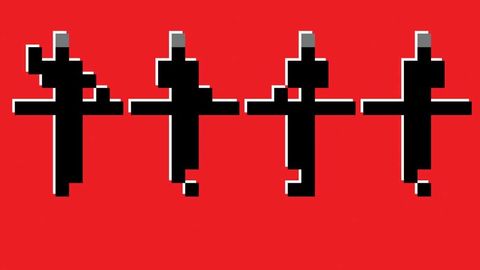Looking back at the 70s, within the musical climate that gave this magazine its name, Kraftwerk were a far from easy proposition for some people. Computers were a largely unknown quantity and there was a distrust of the machines ‘playing themselves’, like a nightmarish subplot from George Orwell’s 1984. And so a group like Kraftwerk, who were flaunting their relationship with hardware, were seen by some to be the epitome of fake, soulless music. This was not helped by a certain post-war xenophobia. When, in 1975, journalist Lester Bangs asked if theirs was a musical “final solution”, the group’s Ralph Hutter countered by extolling the “superior mentality” of the German people. It’s clear now that with Kraftwerk, the German sense of humour was also greatly underestimated. And it still runs freely through these releases, from a single DVD of selected highlights to the full live reworkings of the eight albums from Autobahn onwards.
When Hutter ominously intones ‘Man Machine/Semi-human being’ through his vocoder, it’s played so straight that the effect is deliciously absurd. And it’s accompanied by some striking animated constructivist artwork of red, white and black shapes. These are essentially more robust, expanded versions of the originals, or retreads of their 2005 live releaseMinimum-Maximum, but both the audio and visuals are superb.
Nothing ages more quickly than music about, or ostentatiously using, contemporary technology, but the dancing electronic beats and shiny synth melodies of 1981’s Computer World sound remarkably fresh and timeless. The visuals, displaying ancient computer fonts and numbers, and obsolete terminals, are so beautifully animated that it forms a piece of retro-futurist art that has remained age-proof. But when Hutter mechanically informs us about data held by ‘USA, Scotland Yard and KGB’, he couldn’t be more topical.
Kraftwerk haven’t released any new material in 30 years and one imagines the reason is because they got it so beautifully right at the time. The sedate, cruising-speed motorik of Autobahn is nearly a decade older, but sounds even more modernist. The accompanying video, designed like a cross between a sat nav and a car chase computer game (except that all the vehicles are proceeding in an orderly manner) is stylish without really being involving. The four group members stand wearing jumpsuits adorned with fluorescent strips, like something out of a 1960s sci-fi film, manipulating their consoles throughout. One wonders if they’re actually doing anything and then, on The Robots, they all lift their arms up robotically. This suggests that at this point, at least, the machines really are playing themselves. And it sounds great.


